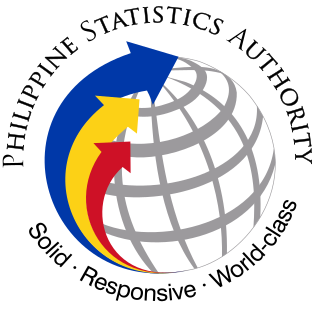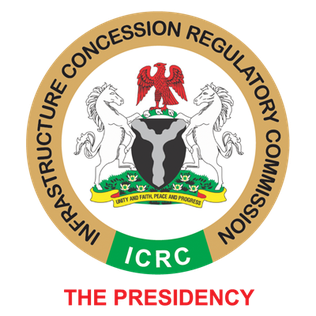In financial services, a broker-dealer is a natural person, company or other organization that engages in the business of trading securities for its own account or on behalf of its customers. Broker-dealers are at the heart of the securities and derivatives trading process.
Property management is the operation, control, maintenance, and oversight of real estate and physical property. This can include residential, commercial, and land real estate. Management indicates the need of real estate to be cared for and monitored, with accountability for and attention its useful life and condition considered. This is much akin to the role of management in any business.

The Philippine Statistics Authority, abbreviated as PSA, is the central statistical authority of the Philippine government that collects, compiles, analyzes and publishes statistical information on economic, social, demographic, political affairs and general affairs of the people of the Philippines and enforces the civil registration functions in the country.
A gaming control board (GCB), also called by various names including gambling control board, casino control board, gambling board, and gaming commission) is a government agency charged with regulating casino and other types of gaming in a defined geographical area, usually a state, and of enforcing gaming law in general.

The Independent Communications Authority of South Africa (ICASA) is an independent regulatory body of the South African government, established in 2000 by the ICASA Act to regulate both the telecommunications and broadcasting sectors in the public interest. Traditionally, telecommunications and broadcasting services operated separately and so has the regulation of the sectors. Broadcasting in South Africa was regulated by the Independent Broadcasting Authority (IBA), whereas telecommunications was regulated by the South African Telecommunications Regulatory Authority (SATRA). Rapid technological developments have led to the convergence of broadcasting and telecommunications services. This also had an influence on the convergence of regulation resulting in the merging of the IBA and SATRA. ICASA functions under the Department of Communications (DoC). It was initially composed of seven Council members. The ICASA amendment Act of 2006 included the Postal services, previously regulated by the Postal Authority into ICASA's mandate. It increased the Council members from seven to nine to accommodate the new members from the Postal Authority.
The Office of the Superintendent of Financial Institutions is an independent agency of the Government of Canada reporting to the Minister of Finance created "to contribute to public confidence in the Canadian financial system". It is the sole regulator of banks, and the primary regulator of insurance companies, trust companies, loan companies and pension plans in Canada.
Environmental Health Officers are responsible for carrying out measures for protecting public health, including administering and enforcing legislation related to environmental health and providing support to minimize health and safety hazards. Environmental Health Officers keep our water, food, air, land, facilities and other environmental factors safe of health hazards, whether biological, chemical or physical. They also address the related factors that impact behaviours. Environmental Health Officers assess and control environmental factors that can potentially affect health, to prevent disease and create health-supportive environments. Environmental determinants of health play a major role in a community’s overall health and well-being, and thus Environmental Health Officers are essential in improving population health outcomes and reducing the burden of disease.

The California Bureau of Gambling Control is a regulatory agency that is part of the California Department of Justice. It regulates legal gambling activities in California to ensure that gambling is conducted honestly, competitively, and free from criminal and corruptive elements. It is one of two agencies in California regulating gambling, along with the California Gambling Control Commission.
OMVIC regulates motor vehicle sales in Ontario. Administering and enforcing the Motor Vehicle Dealers Act on behalf of the Ontario Ministry of Government and Consumer Services (MGCS), OMVIC's mandate is to maintain a fair and informed marketplace by protecting the rights of consumers, enhancing industry professionalism and ensuring fair, honest and open competition for registered motor vehicle dealers.

Tourism in Namibia is a major industry, contributing N$7.2 billion to the country's gross domestic product. Annually, over one million travelers visit Namibia, with roughly one in three coming from South Africa, then Germany and finally the United Kingdom, Italy and France. The country is among the prime destinations in Africa and is known for ecotourism which features Namibia's extensive wildlife.
The Energy Resources Conservation Board (ERCB) was an independent, quasi-judicial agency of the Government of Alberta. It regulated the safe, responsible, and efficient development of Alberta's energy resources: oil, natural gas, oil sands, coal, and pipelines. Led by eight Board members, the ERCB's team of engineers, geologists, technicians, economists, and other professionals served Albertans from thirteen locations across the province.
A risk retention group (RRG) is an alternative risk transfer entity created by the federal Liability Risk Retention Act (LRRA). RRGs must form as liability insurance companies under the laws of at least one state—its charter state or domicile. The policyholders of the RRG are also its owners and membership must be limited to organizations or persons engaged in similar businesses or activities, thus being exposed to the same types of liability. Most RRGs are regulated as captive insurance companies. However, RRGs domiciled in states without captive law are regulated as traditional insurance companies.

The Ghana Immigration Service (GIS) is an agency of the government of Ghana under the Ministry of the Interior. The GIS regulates examination and authorization of application for visas, entry and residence permits in Ghana. Control of foreign nationals in Ghana, Facilitation of Ghanaian passport application processing, border control and management, Refugee registration, protection and management. The service advises on and ensures the effective implementation of all laws and regulations pertaining to immigration and related issues.[1]

The Vanuatu Foreign Investment Promotion Agency (VFIPA), is Vanuatu's National investment promotion agency. It was established by the foreign investment act [cap 248] in 1998 and operating as a unit under the department of Trades and Industry with a mandate to "promote and facilitate foreign investments into Vanuatu.
The Queensland Competition Authority (QCA) is an independent statutory authority that promotes competition as the basis for enhancing efficiency and growth in the Queensland economy. It was established by the Queensland Government in 1997.

Hotel ratings are often used to classify hotels according to their quality. From the initial purpose of informing travellers on basic facilities that can be expected, the objectives of hotel rating have expanded into a focus on the hotel experience as a whole. Today the terms 'grading', 'rating', and 'classification' are used to generally refer to the same concept, that is to categorize hotels.

The Insurance Regulatory and Development Authority of India (IRDAI) is a regulatory body under the jurisdiction of Ministry of Finance, Government of India and is tasked with regulating and licensing the insurance and re-insurance industries in India. It was constituted by the Insurance Regulatory and Development Authority Act, 1999, an Act of Parliament passed by the Government of India. The agency's headquarters are in Hyderabad, Telangana, where it moved from Delhi in 2001.

The Alberta Energy Regulator (AER) is an Alberta corporation, with its main office in Calgary, Alberta. The AER's mandate under the Responsible Energy Development Act (REDA), passed on 10 December 2012 and proclaimed on 17 June 2013, is to provide safe, efficient, orderly, and environmentally responsible development of energy resources in the province. Under the REDA, the Alberta Government established the AER in December 2012 to provide a one-stop shop for regulatory approvals after industry complained about the delays and costs of red tape. The legislation combined duties of the Energy Resources Conservation Board with responsibilities of Alberta Environment and Sustainable Resource Development to create a single entity to administer the Public Lands Act, the Environmental Protection and Enhancement Act and the Water Act. The AER operates at arm's length from the Government of Alberta, under an appointed board of directors headed by Chair David Goldie. On 17 June 2013, all regulatory functions previously carried out by the Energy Resources Conservation Board were taken over by the AER.

The Infrastructure Concession Regulatory Commission (ICRC) is an agency of the Federal Government of Nigeria responsible for the development and implementation of Public-Private Partnership (PPP) framework for the provision of infrastructure services.
The Nepal Tourism Board (NTB) is the official national tourism organization of Nepal which works towards establishing Nepal as a premier holiday destination to the world. The Board provides platform for vision-drawn leadership for Nepal’s tourism sector by integrating Government commitment with the dynamism of private sector. NTB is promoting Nepal in the domestic and international market and is working toward repositioning the image of the country. It also aims to regulate product development activities. The Board chaired by the Secretary at the Ministry of Tourism and Civil Aviation consists of 11 board members with Five Government representatives, five private sector representatives and the Chief Executive Officer. The CEO of NTB is Dr. Dhananjay Regmi a distinguished Tourism entrepreneur, environmentalist, geomorphologist, and glaciologist of Nepal.









